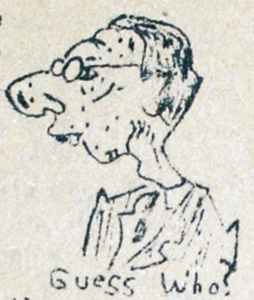Art
(Did you mean a Nevenah Smith fanzine?)
| From Fancyclopedia 2, ca. 1959 |
| Well, maybe that should go in quotes. Fandom has some talented artists, & some who, like Bill Rotsler, have the benefit of training and employment in the field; but many fans, whether artists or not, have now and then turned their hands to illustrating what they're trying to say, or putting what they want to get across in a more expressive medium than words. Much fan art may be considered under Cartoons, where illustration combines with our normal (literary) means of communication. Of other types: nearly every subzine has a cover illustration, which usually shows a fantasy scene having no relation to the contents of the magazine; VOMaidens are the ultimate of this type. Title headings for departments are often embellished irrelevantly; put some rivets on the letters or a spaceship behind them, and that's that. When fiction is included in the magazine it is often illustrated; articles may be, too, tho this is sometimes impossible. Display ads may be decorated. Fragmentary sketches are also used as fillers (hence the byname fillo) or sometimes stuck around on the page to break up the dead-solid type. Well-drawn illustrations for their own sake are rare, tho there are some full-page illustrations with a few lines of poetry inspiring or inspired by it. Most frequently artwork standing alone is cartooning about fan events real or imaginary. On a slightly higher level are short-lived scientificomics in the fanzines, and some caricatures of Wollheim and his "stooges" done by Baltadonis of Philly during the Futurian Wars. Our illustration is of historic importance, because its appearance on a card addressed to DAW was the basis of the Wollheimist charges that he was the object of "libelous and utterly vicious attacks" in the 1938 FAPA campaign. In addition to all these art types, photography has shown up increasingly; first as tipped-in prints in the early 40s, followed by the discovery of photolitho and a process for putting photos on a mimeograph stencil. Sometimes heard is Artoon, coined by Jack Harness to describe his type of drawing but applied to any small illustration of a humorous type. |
| From Fancyclopedia 1, ca. 1944 |
|
Maybe we should put that in quotes. Yes, fandom does have some very talented artists, and some who've had the benefit of training besides. But virtually every fan, whether he's an artist or not, turns his hand to illustrating what he's trying to say, or putting what he wants to say in a more expressive medium. As to types: Nearly every subscription fanzine has a cover illustration, which usually shows an imaginary fantasy scene having no relation to the contents of the magazine; Vomaidens are the ultimate of this type. Title headings for departments are frequently embellished as irrelevantly: put some rivets on the letters and a tower or a spaceship behind them, and that's that. When fiction is included in the magazine, it is usually illustrated. The same sometimes with articles, but this cannot often be done. Display ads may be decorated. Fragmentary sketches are also used as fillers, or stuck around on a page to break up the dead solid type. Well-drawn illustrations for their own sake are rather rare, tho there are some full-page illustrations with a few lines of poetry inspiring or inspired by it. Most frequent artwork standing alone is cartooning about fan events, real or imaginary. On a slitely higher artistic level are some short-lived scientificomics in the fanzines, and some caricatures of Wollheim and his "stooges" by Baltadonis. Our illustration is of historic importance, because its appearance on a card addressed to DAW was the basis for the Wollheimist charge that W was the object of "Libelous and utterly vicious attacks" by his opponents in the 1938 campaign. Your reporter has also seen some unpublishable sketches of the Wollheimists by Jack Agnew, which shocked him greatly. In addition to all these artypes, fotografy has shown up increasingly in recent years. |
| Publishing |
